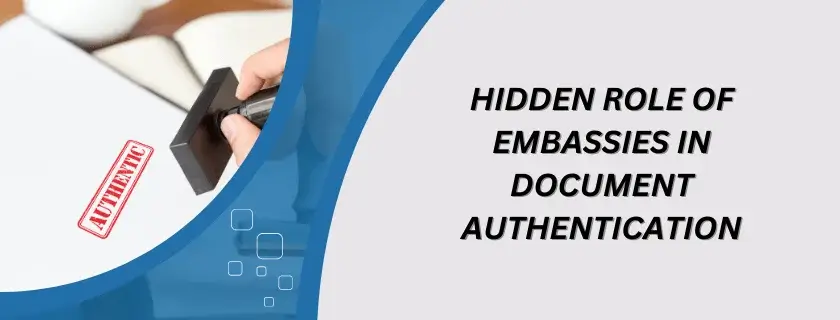The Hague Convention Disclose: How Embassies Play a Hidden Role in Document Authentication
Updated on: 22 Aug 2024
The Hague Convention refers to the Hague Convention Abolishing the Requirement of Legalization for Foreign Public Documents which is an international agreement that reduces the formalities relating to the accreditation of documents for use in other countries. This convention is very essential to prevent the necessity of too many legal procedures and helping international trade, diplomacy, and international cooperation.
However, the process of document attestation is generally said to comprise steps like. First, the documents are then authenticated by the local authorities, this could be notary public or any other authorized department. After this, the documents may require the attestation by Ministry of foreign affairs or other legal bodies of the country of issuance. At last, the documents are delivered to embassy or consulate of the country that the documents will be used in for further recognition.
Embassy certificate attestation is a service that has been accredited to ascertain the genuineness of such documents issued in one country for it to be accepted in the other country. Such document attestation process is important in legal, business, and personal aspects like immigration, employment and Education.
Qatar embassy document attestation is the process where an embassy or a consulate in the country of issue verifies the documents. It helps to check that the documents provided correspond to the necessary standards of Qatar authorities and are acceptable in the territory of Qatar. Usually, documents such as birth certificates, marriage certificates, academic transcripts or any other legal documents such as contracts.
Role of Embassies
Foreign public document certification is mainly the responsibility of embassies, which are chief participants in the Hague convention. These are usually held responsible for ensuring that documents issued in their particular countries are genuine and have been produced as per the set standards as well as they are appropriate for use in other nations.
Authentication Process
The process of Hague Convention comprises several stages. In cases where a document is meant for a particular country other than the one of submission, this document is usually sent to the embassy of the intended country. The embassy analyses the document and the results indicate that it qualifies as authentic depending on the parameters indicated on the convention. This may include looking at the seal, signature and other aspects that may give out the aspect of the document’s genuineness.
The Responsibility of Embassies in document authentication is as follows:
Embassy is highly involved in document authentication of the Hague convention and it can be understood in several points. They possess the required knowledge and skills as to distinguish genuine documents from fake ones. Due to the diplomatic link and the knowledge of the legal requirements of issuing documents, it will be easy for embassies to do the verification of the said documents within a shortest period of time and with higher efficiency.
The main roles of the embassies are to act as representatives of one country in the territory of the other. These the original documents are then certified to show that they will be accepted by other governments as they are without any legal issues arising from their use. These make the authentication process more credible and thus becomes more of a solid process in maintaining integrity.Also, embassies fulfil the important function of the link between the country of origin and the country of destination. They are required to forward apostille documents to the concerned offices in the receiving country, so that they can receive proper attention and recognition. All these make it easy for people to conduct business across the borders, foster diplomacy, and reduce cases of fraud.
Advantages of Embassies in document authentication
The engagement of the embassies in the authentication process has the following advantages to the individuals and government. To the individuals, the procedures involved in the process of authentication of documents as well as the format has been made more simplified and uniform by the Hague convention. This in turn means that the costs and formalities required in legal procedures are eased making international business transactions easier and efficient.
The Hague Convention’s simplified method of authentication is advantageous due to its promotion of international cooperation which leads to the support for trade and improved diplomatic relations among countries. Thus, the convention allows authorities to spend more time on various essential issues rather than spending time on legal procedures and being sure of the documents’ authenticity and credibility.
For Assistance Contact:- Brilliance
Attestation

